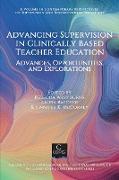- Start
- Advancing Supervision in Clinically Based Teacher Education
Advancing Supervision in Clinically Based Teacher Education
Angebote / Angebote:
Supervision in teacher education is entering an exciting time. In the last decade, national reports calling for the transformation of teacher preparation have advocated for greater school-university collaboration and increased clinical preparation of teachers (AACTE, 2018, NCATE, 2010). Thus, institutions with teacher preparation should be increasingly concerned with the clinical component of their teacher certification programs (AACTE, 2010, 2018, NCATE, 2001, NEA, 2014). However, supervision in teacher preparation has historically been held in low regard, (Beck & Kosnik, 2002, Feiman-Nemser, 2001, The Holmes Group, 1986, Hoover, O'Shea, & Carroll, 1988, Soder & Sirotnik, 1990) even though research has shown that high-quality supervision promotes teacher candidate learning (Bates, Drits, & Ramirez, 2011, Burns, Jacobs, & Yendol-Hoppey, 2016, Darling-Hammond, 2014, Gimbert & Nolan, 2003, Lee, 2011). In fact, university supervisors "may be the most undervalued actors in the entire teacher preparation equation when one considers the knowledge, skills, and dispositions they must have to teach about teaching in the field" (Burns & Badiali, 2016, p. 156). Despite this research, the function of supervision has often been relegated to adjunct faculty or even removed the university-based supervisor altogether in some colleges/schools of education (McIntyre & McIntyre, 2020, NCATE, 2010, Slick, 1998, Zeichner, 1992, 2005). These practices are incredibly problematic for actualizing clinically based teacher education. Thus, the road to transforming teacher education must involve addressing such long standing misperceptions about what supervision is, what purpose it serves, and how it can be renewed from an afterthought to become the driving engine of high quality teacher preparation.
Advancing Supervision in Clinically Based Teacher Education: Advances, Opportunities, and Explorations aims to elevate supervision and supervisors, as undervalued actors, by disseminating high-quality manuscripts on this critical area of study. The chapters in this book tackle the persistent issue of devaluing and marginalizing supervision in some institutions of higher education by sharing current research, illuminating challenges of supervising in the current high stakes accountability climate, and offering innovative ideas that can improve supervision in clinically based teacher education.
Folgt in ca. 10 Arbeitstagen
